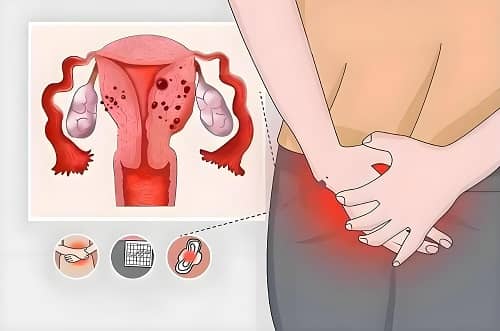Adenomyosis is a common gynecological condition that can cause abnormal menstruation, severe period pain, and other discomforts. Understanding its symptoms can help women detect the condition early and seek appropriate treatment. Below are the common symptoms of adenomyosis.

Table of Contents
- 1. Menstrual Cramps (Dysmenorrhea)
- 2. Heavy Menstrual Bleeding
- 3. Pain During Intimacy
- 4. Discomfort During Bowel Movements or Urination
- 5. Infertility
1. Menstrual Cramps (Dysmenorrhea)
Severe menstrual cramps are one of the most common symptoms of adenomyosis.
- Increasing Pain Over Time: Many women experience progressively worsening lower abdominal pain during their periods.
- Impact on Daily Life: The pain may radiate to the lower back and thighs, making it difficult to perform daily activities.
2. Heavy Menstrual Bleeding
Adenomyosis can cause excessive menstrual bleeding, sometimes accompanied by prolonged periods.
- Abnormal Blood Flow: Periods may last longer than seven days, with increased blood volume and blood clots.
- Risk of Anemia: Persistent heavy bleeding can lead to anemia, causing fatigue, dizziness, and pale skin.
3. Pain During Intimacy
Some women with adenomyosis may experience pain during intercourse, especially before or after menstruation.
- Severe Discomfort: The pain is often concentrated in the lower abdomen and may feel like a dull ache or sharp stabbing pain.
- Impact on Relationships: Chronic discomfort may affect intimacy and emotional well-being.
4. Discomfort During Bowel Movements or Urination
Adenomyosis can put pressure on surrounding organs, leading to urinary or digestive issues.
- Difficulty with Bowel Movements: Some women experience constipation or painful bowel movements, especially during menstruation.
- Frequent Urination: If adenomyosis affects the bladder, it may lead to frequent urination or difficulty emptying the bladder.
5. Infertility
Adenomyosis may affect a woman’s ability to conceive, making pregnancy more difficult.
- Reduced Fertility: The condition can interfere with embryo implantation, decreasing the chances of conception.
- Increased Risk of Miscarriage: Even if pregnancy occurs, there may be a higher risk of miscarriage or preterm birth.
Conclusion
The symptoms of adenomyosis vary from person to person but often include severe menstrual pain, abnormal bleeding, and discomfort during daily activities. If you experience persistent period pain or other related symptoms, it is important to seek medical attention for diagnosis and treatment. Early detection and appropriate management can improve quality of life and prevent complications.